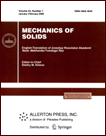 | | Mechanics of Solids
A Journal of Russian Academy of Sciences | | Founded
in January 1966
Issued 6 times a year
Print ISSN 0025-6544
Online ISSN 1934-7936 |
Archive of Issues
| Total articles in the database: | | 13427 |
| In Russian (Èçâ. ÐÀÍ. ÌÒÒ): | | 8178
|
| In English (Mech. Solids): | | 5249 |
|
| << Previous article | Volume 44, Issue 6 / 2009 | Next article >> |
| E. V. Rozhkova, "Recursive-Operator Method in Vibration Problems for Rod Systems," Mech. Solids. 44 (6), 915-926 (2009) |
| Year |
2009 |
Volume |
44 |
Number |
6 |
Pages |
915-926 |
| DOI |
10.3103/S0025654409060090 |
| Title |
Recursive-Operator Method in Vibration Problems for Rod Systems |
| Author(s) |
E. V. Rozhkova (Tashkent Institute of Railway Transport Engineers, Adylkhodzhieva 1, Mirabadskii r-n, Tashkent, 100167 Uzbekistan, rojkova-elena@mail.ru) |
| Abstract |
Using linear differential equations with constant coefficients describing one-dimensional dynamical processes as an example, we show that the solutions of these equations and systems are related to the solution of the corresponding numerical recursion relations and one does not have to compute the roots of the corresponding characteristic equations. The arbitrary functions occurring in the general solution of the homogeneous equations are determined by the initial and boundary conditions or are chosen from various classes of analytic functions. The solutions of the inhomogeneous equations are constructed in the form of integro-differential series acting on the right-hand side of the equation, and the coefficients of the series are determined from the same recursion relations. The convergence of formal solutions as series of a more general recursive-operator construction was proved in [1]. In the special case where the solutions of the equation can be represented in separated variables, the power series can be effectively summed, i.e., expressed in terms of elementary functions, and coincide with the known solutions. In this case, to determine the natural vibration frequencies, one obtains algebraic rather than transcendental equations, which permits exactly determining the imaginary and complex roots of these equations without using the graphic method [2, pp. 448-449]. The correctness of the obtained formulas (differentiation formulas, explicit expressions for the series coefficients, etc.) can be verified directly by appropriate substitutions; therefore, we do not prove them here. |
| Keywords |
recursive-operator method, matrix of constant coefficients, natural vibration frequency, wave setting, arbitrary analytic function |
| References |
| 1. | Yu. L. Spivakov,
Special Classes of Solutions of Linear Differential Equations and Their Applications to Anisotropic and Inhomogeneous Elasticity
(Fan, Tashkent, 1986)
[in Russian]. |
| 2. | Yu. N. Rabotnov,
Mechanics of Deformable Solids
(Nauka, Moscow, 1979)
[in Russian]. |
| 3. | A. P. Filippov, Vibrations of Deformable Systems
(Mashinostroenie, Moscow, 1970) [in Russian]. |
| 4. | M. F. Verigo and A. Ya. Kogan,
Interaction between Railway Track and Rolling Stock
(Transport, Moscow, 1986)
[in Russian]. |
| 5. | E. V. Rozhkova,
"Solution of Spatial Dynamical Problem
of Interaction between the Railway and the Rolling Stock
by the Recursive-Operator Method,"
Vestnik KazATK,
No. 1, 128-131 (2006). |
| 6. | O. A. Savinov,
Modern Constructions of Machine Foundation and Their Calculations
(Stroiizdat, Moscow, 1979)
[in Russian]. |
| 7. | B. A. Bondarenko,
Operator Algorithms in Differential Equations
(Fan, Tashkent, 1984)
[in Russian]. |
| 8. | A. P. Filin,
Applied Mechanics of Solids, Vol. 3
(Nauka, Moscow, 1981)
[in Russian]. |
| 9. | V. N. Frolov and E. V. Rozhkova,
"Operator Algorithm for Solving Linear Differential Equations Describing
One-Dimensional Dynamical Processes,"
in Questions of Computational and Applied Mathematics, No. 112
(In-t Kibernet. AN RUz, Tashkent, 2003),
pp. 99-108
[in Russian]. |
|
| Received |
11 October 2005 |
| Link to Fulltext |
|
| << Previous article | Volume 44, Issue 6 / 2009 | Next article >> |
|
 If you find a misprint on a webpage, please help us correct it promptly - just highlight and press Ctrl+Enter If you find a misprint on a webpage, please help us correct it promptly - just highlight and press Ctrl+Enter
|
|

 Russian
Russian  English
English